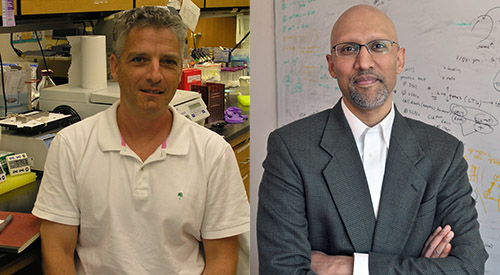Allada and Turek featured in Northwestern Medicine Magazine
Professors Ravi Allada and Fred Turek featured in the latest edition of Northwestern Medicine Magazine
Ravi Allada and Fred Turek, Professors in the Department of Neurobiology, discuss their research in the magazine's "Rhythms of Life" feature.
Dr. Allada and Dr. Turek along with professors Phyllis Zee and Joseph Bass were featured in the latest edition of Northwestern Medicine magazine. In the feature, written by Cheryl SooHoo, the professors discuss their research and the importance of circadian science in medicine. Below is an excerpt of the article that can by found at Northwestern Medical Magazine.
Disruption and Disease
Mice don't stay up late to party or watch a movie. The nocturnal creatures stick to their naturally evolved body clocks: they get shut-eye during the day and feed and play at night. Exhibiting similar clock function to humans at a molecular level, mice have allowed Fred W. Turek, PhD, Charles E. and Emma H. Morrison Professor of Biology in the Weinberg College of Arts and Sciences, and of neurology at the Feinberg School and CSCB director, to separate behavior from biology in the study of the circadian clock system.
"Humans are the only species that disobey their biological clocks on a regular basis," says Dr. Turek, who was a member of the pioneering Northwestern research team that identified the first clock gene in mammals. "However, we can turn our mice into shift workers, so to speak, by changing their light-dark cycles so we can better understand the biological processes of circadian disruption."
Forced to work the "graveyard" shift, the mice in his studies have mirrored ailments often seen in humans with similarly misaligned biological rhythms. Late night and early morning workers, for example, often fight the battle of the bulge. Dr. Turek and his colleagues found the same to be true of animals that ate when normally they would be sleeping. The midnight munchers packed on as much as 48 percent more weight over their baseline than mice fed the same food at natural waking hours. Female shift workers such as nurses and flight attendants with constant jet lag have been shown to experience fertility and menstrual problems. The Turek research group discovered that mice with severe circadian disruption had significantly poorer pregnancy outcomes.
Last June, Dr. Turek and collaborators at Rush University Medical Center in Chicago published results of a study exploring abnormal circadian timing with the development of alcoholic liver disease. The disorder only occurs in 30 percent of severe alcoholics. They found in animal models that out-of-whack rhythms increased susceptibility to alcohol-induced "gut leakiness" or weakness in the intestinal lining that, in turn, more easily paved the way for liver damage.

(L) Joseph T. Bass, MD, PhD, Charles F. Kettering Professor of Medicine and chief of endocrinology and (R) Ravi Allada, MD, chair and professor of neurobiology at WCAS and pathology at FSM and associate director of the Center for Sleep and Circadian Biology.
Of Flies and Men
Although they snooze a little longer than people, common fruit flies (Drosophila melanogaster) get up at dawn and settle down after dusk much like we do. Interestingly, their DNA has made the tiny insect a good stand-in for humans. Says Ravi Allada, MD, chair and professor of neurobiology in the Weinberg College and of pathology at the Feinberg School and associate director of the CSCB, "One of the more amazing stories of science is that the genes regulating time in the wake-sleep cycle of flies are similar to ours."
Dr. Allada has gleaned much from his fly subjects. In 2011 his research team reported the discovery of a gene they named "twenty-four," that caused flies to sleep through their natural alarm clocks. Flies had a harder time waking in the absence of the gene that translates the protein PER, critical to regulating the 24-hour clock. This finding led to the recent identification of another gene, Ataxin-2, that also keeps biological rhythms on schedule in the fly. In humans, mutations of Ataxin-2 have been involved in causing neurodegenerative disorders such as amyotrophic lateral sclerosis (ALS) or Lou Gehrig's disease.
"We are now looking very closely at the connection of Ataxin-2 to the neurodegenerative disease process," says Allada. "People with neurodegenerative conditions often exhibit disruptions in their sleep-wake cycles. Is their disease preventing them from sleeping well or are disrupted circadian rhythms critical to the development of disease? Does poor sleep, for example, put you at risk for Alzheimer's?"
Article Written by
Cheryl SooHoo
Photography by
Laura Brown, Bruce Powell
29 May 2014
